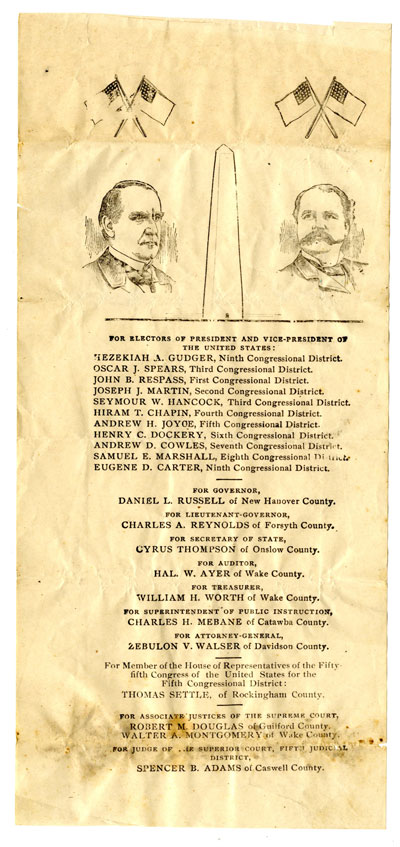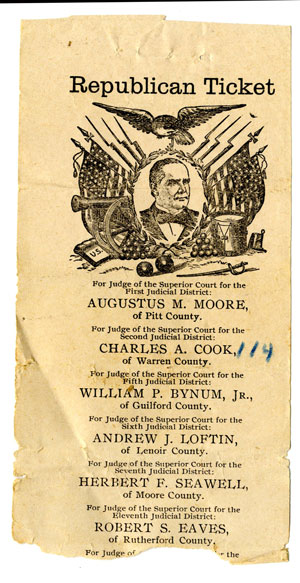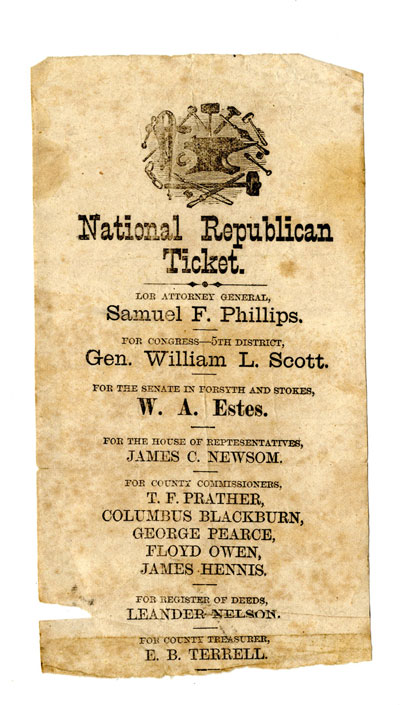
While paper ballots haven’t gone the way of the Edsel, you’d be hard pressed to find ones like those used in North Carolina’s elections in the 19th century. As Douglas W. Jones, co-author of Broken Ballots: Will Your Vote Count notes in his “Brief Illustrated History of Voting”, the first paper ballots were slips provided by the voter himself. But little time passed before political parties provided voters with a pre-printed ticket listing their slate of candidates.
The pre-printed ballots provided the political parties with several controls over voting. As noted in a previous post, the parties sometimes printed their tickets on colored sheets of paper. Because voting often took place in the open, party loyalists, who traded cash for votes on election day, could watch to ensure that the voter they had just bribed upheld his end of the bargain by voting for the right slate. In time, supporters of clean elections pushed through regulations requiring all tickets be printed on white paper. But the new requirements did not curb the parties’ previous practices. They simply printed their tickets on paper with slightly different shades of white. The political parties also realized that through their choice of typography and spacing on their tickets they could reduce the likelihood of voters veering from the party slate and writing in a different choice.
Increasing concerns about election abuses in the 1870s and 1880s led reformers to push for private voting and the creation of an official, non-partisan ballot, commonly known as the Australian ballot because legislators in Australia had led the way by adopting a secret, official ballot in the 1850s. In the United States, Kentucky was the first state to adopt the Australian ballot, employing it in Louisville municipal elections in February 1888. Massachusetts followed three months later, requiring its use statewide. In the ensuing years, other states also required official ballots, in some cases only for local elections and, in others, for statewide races.
In North Carolina the first use of the Australian ballot was in New Hanover County. State legislators passed legislation requiring its use there in 1909. Twenty years passed before lawmakers mandated official ballots for elections throughout the state. In 1928 O. Max Gardner, a Democrat from Shelby, campaigned for governor on a pledge to implement the Australian ballot statewide. In his inaugural address on January 11, 1929, Gardner told citizens that he believed elections in North Carolina were “fair, honest, and just,” but “conditions may still be improved by the passage of a fair and just secret ballot law.” The first issue addressed by the General Assembly in 1929 was the secret ballot. Although some senators opposed the legislation for fear that it could reduce the strength of the Democratic party, the bill passed in the Senate 41 to 9. The margin was wider in the House, where lawmakers approved the secret ballot 92 to 14.
The party tickets above and below predate the Australian ballot. The 1896 Republican ticket (above) features line art of William McKinley (left) and his running mate, Garret Hobart. Of course, McKinley and Hobart prevailed in the election as did Daniel L. Russell, who became the first Republican elected governor of North Carolina since the end of Reconstruction in 1877. In the Presidential portion of the ticket note the listing of electors, a reminder that the electoral college actually determines the occupant of the White House.
The 1898 Republican judicial ticket (below) is a reminder that judicial elections were partisan until the 1990s. In 1996 the General Assembly established non-partisan elections for Superior Court judges, effective in 1998. In 2001 legislators passed a bill requiring non-partisan elections for District Court judges. And in 2002, lawmakers enacted legislation making elections for the state Court of Appeals and Supreme Court non-partisan.

It’s unclear whether the tickets pictured here were actual ballots or simply a list of candidates provided by the Republican Party. They are among items in the Walter Winbourne King Papers in our sister collection, the Southern Historical Collection. King (1846-1913) was a Stokes County attorney and politician. He was elected to the state House in 1876 and served there until he resigned in 1878 to become solicitor, known today as a district attorney, for the area serving Stokes County.

